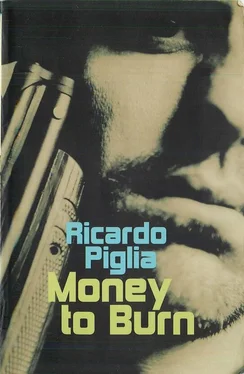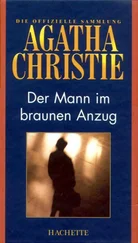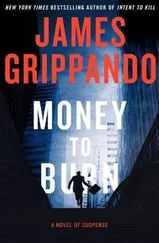Ricardo Piglia - Money to Burn
Здесь есть возможность читать онлайн «Ricardo Piglia - Money to Burn» весь текст электронной книги совершенно бесплатно (целиком полную версию без сокращений). В некоторых случаях можно слушать аудио, скачать через торрент в формате fb2 и присутствует краткое содержание. Год выпуска: 2004, Издательство: Granta UK, Жанр: Современная проза, на английском языке. Описание произведения, (предисловие) а так же отзывы посетителей доступны на портале библиотеки ЛибКат.
- Название:Money to Burn
- Автор:
- Издательство:Granta UK
- Жанр:
- Год:2004
- ISBN:нет данных
- Рейтинг книги:5 / 5. Голосов: 1
-
Избранное:Добавить в избранное
- Отзывы:
-
Ваша оценка:
- 100
- 1
- 2
- 3
- 4
- 5
Money to Burn: краткое содержание, описание и аннотация
Предлагаем к чтению аннотацию, описание, краткое содержание или предисловие (зависит от того, что написал сам автор книги «Money to Burn»). Если вы не нашли необходимую информацию о книге — напишите в комментариях, мы постараемся отыскать её.
Money to Burn — читать онлайн бесплатно полную книгу (весь текст) целиком
Ниже представлен текст книги, разбитый по страницам. Система сохранения места последней прочитанной страницы, позволяет с удобством читать онлайн бесплатно книгу «Money to Burn», без необходимости каждый раз заново искать на чём Вы остановились. Поставьте закладку, и сможете в любой момент перейти на страницу, на которой закончили чтение.
Интервал:
Закладка:
The three remain calm, seated on the floor with their backs to the wall, covering every angle into the flat; they're simultaneously tranquil and high as kites, full of amphetamines, loaded with every kind of drug. The police are always more fearful than the gangsters, they have to do it all for a salary (according to Dorda), a meagre salary at that, for their retirement years, with the little woman at home whining because her workhorse earns so poorly, has to do night shifts, outside in the rain, who the hell would think of becoming a cop, only a saddo, a guy who has no better idea of what to do with his life, a 'pusillanimous' type (he had acquired the adjective during his time in jail, and he enjoyed it because it sounded like someone without a soul, spirit, anima). 'They become cops because they want a secure existence and that's how they lose their lives, since, to get them out of here, they were going to approach them calmly, because there was no way they were going to gamble their lives, except that a few of the cops (Police Commissioner Silva, for example) knew that the loot was all stashed inside, and imagined they could get in there ahead of the rest, stick the dosh in their pockets, then say that nothing had been found. There was nothing there at all.'
But it was a tricky situation, and the game was up. The Kid decided to tell them they still had half the green stuff left, to be offered as a sweetener to anyone who helped them get away. He had said as much to the chief of police over the intercom, and the message had been broadcast on television, as proof (according to the journalists) that the criminals were willing to gamble the lives of everyone involved in this delicate recovery operation. 'Recovering what or whom?' the Kid had wondered to himself, according to Dorda. 'See how they'll come out with any old rubbish.'
'They're not going to be able to force us out, they'll have to negotiate.'
'To get us out, they'll have to come up the staircase and cross the corridor. It'll be like potting starlings.'
The Kid went into the kitchen and leaned on the buzzer to the intercom, lifted the receiver and began shouting until he heard someone downstairs actually listening to him.
'If that stinking sonofabitch Silva is down there, send him up to negotiate, he can't cry off this time. We have a proposal to make, 'cause if we don't, a lot of people are down to die tonight… You've got to get involved, Uruguayan arseholes, at some point in this story… We're Peronist activists, exiles, fighting for the General's return. We've a lot of information, Silva, would you like me to start telling them what I know?'
There was a pause, you could hear the cables crackling and the soft hum of the rain, below, but the police down there listening offered no reply.
Silva then approached the intercom and leaned on the buzzer. He wasn't going to speak to those pieces of shit, he was going to spring them from their lair and only then were they going to have to squeal.
'Get us a cab, leave us free to go to Chuy, on the border, and we'll hand over the loot and won't speak to anyone. What d'you think, boss?' said the Kid.
There was a silence, you could hear the Gaucho whistling as if he were summoning a dog, and eventually a Uruguayan police officer approached the intercom and looked steadily at Silva, who gave him a gesture of consent.
'The Uruguayan police do not negotiate with criminals, sir. Surrender and you'll save your lives. If not, we'll be obliged to take even more drastic action.'
'Go fuck yourself.'
'Your rights are protected by the magistrate.'
'What liars you are, you arseholes, as soon as you've got us, you'll stick us into the pan and fry our guts.'
The crowd of journalists registered the conversation on their microphones pressed to the wall surrounding the intercom.
Another crowd of the curious had begun to circulate in the area when they heard the first shots and the TV cameras of the Montecarlo de Montevideo channel had begun a live broadcast, covering events as they unfolded. It even reached the gunmen (as the press had pointed out it would) watching television in their room, watching the events of which they were themselves the protagonists. And in all the neighbouring houses it became commonplace for individuals to shield themselves with cushions to protect themselves from stray bullets, or to hide under their beds, still watching what was happening in their very own neighbourhood. For their part, radios were relaying the siege via live transmissions from flats they had previously rented, and journalists were circulating the immediate environment of the buildings with their microphones permanently on. For hours the entire population of Montevideo was tuned in to the momentous events that were shaking the country.
At 11.50 p.m., three men offered themselves as volunteers, in order to enter and break down the apartment door. After a brief deliberation, the police command accepted their offer and ordered them to take action. Cautiously, Inspector Walter Lopez Pachiarotti, along with Commissioners Washington Santana Cabris de León, in charge of the Department of Investigations, and Domingo Ganduglia, in charge of Division 20a, crouched low and ran across the entrance to the building and advanced along the corridor. The three men went into the central hall in the apartment block, at the far end of which a staircase doubles to the right, and ends up at the doors to flat number nine. Officer Galindez volunteered himself as an additional fourth man to cover the rearguard action. All four then filed up the staircase, forming a rhomboid in the classic formation of a frontal attack.
Ganduglia went in front with a cocked Uzi submachine-gun, bringing along Santana Cabris on his left and Lopez Pachiarotti on his right, in a protective fan closed by Galindez at its base, between the two of them. The lights had been turned out and the staircase was a dusky tunnel rising towards the light in the besieged apartment. A sepulchral silence flooded the place, men advanced tense and pitched forward. Suddenly the fourth man at the back tripped on a step and, in falling, grabbed hold of Ganduglia, who fell in turn. That was what saved his life since, through a window to the right of those climbing up the staircase, Dorda had positioned his weapon and now fired off a volley of machine-gunfire, aiming from the floor upwards, hitting Cabris in the thorax and the head and wounding the rest.
'They gave it me, the sonsofabitch… my sainted mother,' one could hear the unfortunate man wail while Dorda laughed out loud from the window.
'Pig,' he yelled, 'executioner, I got you. Come on, come on up, shitless Uruguayans…'
Facing upwards, with three gigantic wounds in his body and his eyes wide open, in agony, breathing with hoarse groans, in the midst of a horrific haemorrhage, the thirty- two-year-old officer was the father of two children about to be made orphans by his death. Beside him, another wounded man was dragging himself towards the exit, while a third stared at the blood gushing from his chest and could not believe that his ill fortune had brought him to realize his own worst fears. Meanwhile Officer Ganduglia felt no pain at all, only cold, as if his own hand on his belly were made of ice. He had an abdominal wound and didn't even want to look at it.
Beneath the headlamps on the lorries and the outside lamps, in the zone illuminated by the spotlights, lit to prevent the gunmen from slipping away through the windows, the remains of the two dead young men and the third man with the stomach wound were laid out on the pavement. They looked less like two young men who had departed this life (according to the reporter on El Mundo ) than like something thrown out by a cement mixer, nothing more was left of them than lumps of bone, pieces of intestines, and hanging flesh belonging to those who, it was now impossible to believe, had so recently been endowed with life. For those who die from bullet wounds don't die cleanly as in war films, where the wounded give an elegant sort of pirouette and fall, whole, like wax dolls; no, those who die in a shoot-out are decimated by the firepower and bits of their bodies get strewn across the floor, like animal parts in a slaughterhouse.
Читать дальшеИнтервал:
Закладка:
Похожие книги на «Money to Burn»
Представляем Вашему вниманию похожие книги на «Money to Burn» списком для выбора. Мы отобрали схожую по названию и смыслу литературу в надежде предоставить читателям больше вариантов отыскать новые, интересные, ещё непрочитанные произведения.
Обсуждение, отзывы о книге «Money to Burn» и просто собственные мнения читателей. Оставьте ваши комментарии, напишите, что Вы думаете о произведении, его смысле или главных героях. Укажите что конкретно понравилось, а что нет, и почему Вы так считаете.












